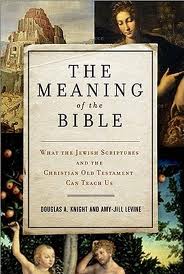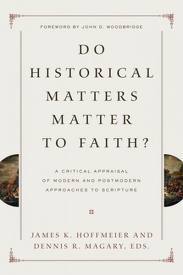 I just read The Meaning of the Bible: What the Jewish Scriptures and Christian Old Testament Can Teach Us
I just read The Meaning of the Bible: What the Jewish Scriptures and Christian Old Testament Can Teach Us (HarperOne, November 2011) by Douglas A. Knight and Amy-Jill Levine, both of Vanderbilt University. I think it is a great resource for students of the Bible, I want to recommend it wholeheartedly.
Running about 450 pages, this book is best described as a balanced, succinct, and readable introduction to reading the Bible rooted in the broader historical-critical academic conversation, while also helping readers see the implications of that conversation for understanding what the Bible means.
In other words, what’s the payoff for everyday readers being down with modern biblical scholarship? The answer is a lot.
One can also describe the book as a wonderful resource for students asking what scholars are saying about any one of a number of issues pertaining to Old Testament scholarship.
Anyone abreast of the scholarly issues will read Knight and Levine’s assessment of, say, the exodus and the conquest, and see immediately that they are actually trying to help readers, not blast them. But by “helping” readers, they are not trying to defend the Bible–and equating helping and defending is a common mistake in the Evangelical mindset.
The alternative, likewise a caricature of Evangelicalism, is unbounded skepticism, but clearly our authors are not of that mold. Rather, they offer sober judgments and leave readers feeling like their Bible has been put in context, not deconstructed.
I can see that for conservative Evangelicals, the methodology and conclusions of the authors will pose obstacles, if not provide clear evidence of compromise with “unbelief,” but this book deserves much more serious attention.
not provide clear evidence of compromise with “unbelief,” but this book deserves much more serious attention.
If anything, I would hope that this book could provide a balance to the more apologetic treatments of Scripture that beset Evangelicalism, most recently Do Historical Matters Matter to Faith?: A Critical Appraisal of Modern and Postmodern Approaches to Scripture. I want to appeal especially to readers who might not be familiar with historical-critical scholarship, but who, after reading this book, might be tempted to conclude that non-Evangelical biblical scholarship is bankrupt, with little to offer the discerning faithful reader.
The Meaning of the Bible is divided into four parts and each of the fourteen chapters treats a particular theme. It is not immediately clear what function the four parts has, except perhaps to break up the content for readers.
The themes covered are:
The History of Ancient Israel (overview of the Old Testament and reconstructions of history)
The Literary Heritage of Israel (translation, literary conventions, authorship issues)
Land and Settlement (Israel’s environs, topography, settlement of the land)
Law and Justice (written and oral law, law in the ancient world)
The Divine (names of God, portraits of God, one God among many gods)
The Cultus (tabernacle, temple, priests, sacrifice)
Chaos and Creation (creation texts in ancient Near Eastern context)
Continuation and Contemplation (Israel’s search for a home and the birth of apocalyptic)
Self and Other (Israel’s identity vis-a-vis the surrounding peoples)
Sexuality (marriage, divorce, adultery, abortion, sexual abuse)
Politics and Economy (tribes, clans, households, cities, nation-states)
Diaspora (loss of the northern kingdom, exile of the southern, and their aftermath)
Critique and Reform (prophetic tradition and Israel’s historians as critics)
Wisdom and Theodicy (biblical and postbiblical wisdom traditions)
You can see a lot is packed in to these fourteen chapters.
Bottom line: If you read this book and grasp the issues, you will have a great working knowledge of reading the Old Testament in our modern world. If you are going to seminary, or just got out and didn’t pay attention, or if you’re just plain curious about the Old Testament, this is a book you will want to have.
